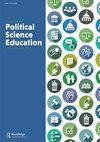Review of The PhD Parenthood Trap: Caught Between Work and Family in Academia
IF 0.6
Q3 POLITICAL SCIENCE
引用次数: 0
Abstract
As I write these words, it’s a Friday evening at 8 pm and my four-year-old daughter and twenty-month-old son are playing and watching television in the background of the living room where I have my desk set up so that I can multi-task between reading, writing, adjusting the volume, and fetching cereal or some other snack. Yet, I know if parents like myself do not find ways to become tenured, productive academics, our discipline and especially our students will suffer from the loss of diversity. Many of us have heard some variation of the joke that academics have all the flexibility in their work... the flexibility to work all the time. It is true, the highly individual and potentially limitless structure of academia, and of research in particular, incentivizes working beyond what could traditionally be called “normal working hours.” As academics, we build our own research agenda or “pipeline.” That said, research success relies on various gatekeepers and the stakes for success are very high (e.g. tenure). This system demands and further incentivizes continuous productivity—to an extent, those who are able to put in more hours, whether in research, teaching, or service, are more “successful.” Preserving time and space for personal life and activities, is the responsibility of the individual. However, for parents (and other caretakers), the demands for personal time are not solely internal, and productive and engaged academic parents often find themselves struggling and juggling to achieve a balance between their academic work and tending for their families. One of the key challenges of academic parenthood is that typical childbearing ages coincide with the early academic years when the stakes are at their highest (dissertation, job market, tenure). For most, writing a dissertation, landing an academic job, and achieving tenure are nearly impossible without working beyond the 40-hour work week. Professional tasks not only push their way both into time parents want to spend time with their children, but also more problematically into hours when there is no or limited childcare. While academia can be an exceptionally rewarding career and can indeed offer some degree of flexibility, parents, caretakers, and women especially, struggle to balance this demanding (even if self-imposed demanding) career with their home lives, creating what Crawford and Windsor refer to as “the PhD Parenthood Trap.” The implications of parenthood in academia are numerous. The focus of this review is how “chutes and ladders,” a range of policy-level and individual factors that may博士生育儿陷阱述评:学术界夹在工作与家庭之间
当我写这些话的时候,是一个周五的晚上8点,我4岁的女儿和20个月大的儿子正在客厅的后台玩电视,我把桌子放在那里,这样我就可以在阅读、写作、调节音量和拿麦片或其他零食之间进行多任务处理。然而,我知道,如果像我这样的父母不能找到方法成为终身的、富有成效的学者,我们的学科,特别是我们的学生将遭受多样性的丧失。我们很多人都听过这样一个笑话:学者的工作非常灵活……随时工作的灵活性。的确,学术界(尤其是研究领域)高度个性化和潜在无限的结构,鼓励人们在传统上所谓的“正常工作时间”之外工作。作为学者,我们建立自己的研究议程或“管道”。也就是说,研究的成功依赖于各种各样的看门人,而且成功的风险非常高(例如终身教职)。这种制度要求并进一步激励持续的生产力——在某种程度上,那些能够投入更多时间的人,无论是在研究、教学还是服务方面,都更“成功”。为个人生活和活动保留时间和空间是个人的责任。然而,对于父母(和其他照顾者)来说,对个人时间的需求并不仅仅是内在的,而且富有成效和投入的学术父母经常发现自己在努力和挣扎中实现学业和照顾家庭之间的平衡。学术父母面临的主要挑战之一是,典型的生育年龄与早期学习年龄相吻合,而这段时间的风险最高(论文、就业市场、终身职位)。对大多数人来说,如果不超过每周40小时的工作时间,写一篇论文、找到一份学术工作、获得终身教职几乎是不可能的。专业任务不仅占用了父母想要和孩子在一起的时间,而且更有问题的是,这些时间占用了父母没有或有限的育儿时间。虽然学术界可能是一个非常有益的职业,确实可以提供一定程度的灵活性,但父母、看护人,尤其是女性,很难在这种要求很高(即使是自我强加的要求)的职业与家庭生活之间取得平衡,这就造成了克劳福德和温莎所说的“博士父母陷阱”。在学术界,为人父母的含义是很多的。本次审查的重点是如何“滑槽和梯子”,一系列政策层面和个人因素,可能
本文章由计算机程序翻译,如有差异,请以英文原文为准。
求助全文
约1分钟内获得全文
求助全文
来源期刊

Journal of Political Science Education
POLITICAL SCIENCE-
CiteScore
1.80
自引率
36.40%
发文量
69
期刊介绍:
The Journal of Political Science Education is an intellectually rigorous, path-breaking, agenda-setting journal that publishes the highest quality scholarship on teaching and pedagogical issues in political science. The journal aims to represent the full range of questions, issues and approaches regarding political science education, including teaching-related issues, methods and techniques, learning/teaching activities and devices, educational assessment in political science, graduate education, and curriculum development. In particular, the journal''s Editors welcome studies that reflect the scholarship of teaching and learning, or works that would be informative and/or of practical use to the readers of the Journal of Political Science Education , and address topics in an empirical way, making use of the techniques that political scientists use in their own substantive research.
 求助内容:
求助内容: 应助结果提醒方式:
应助结果提醒方式:


